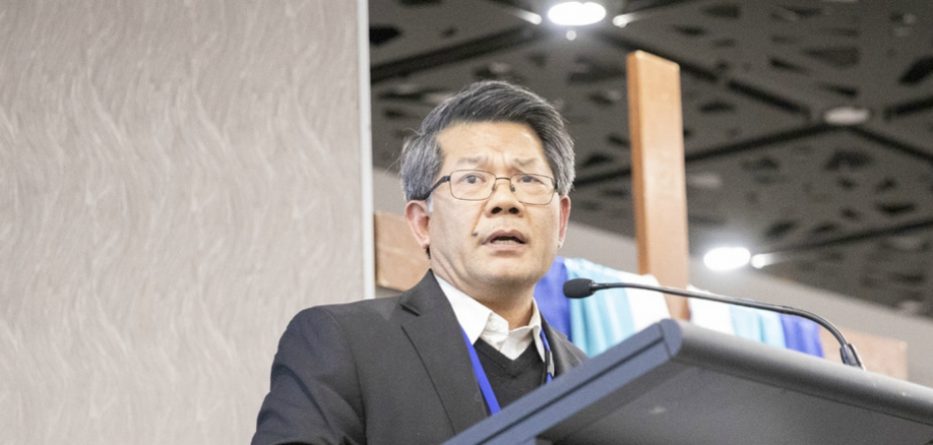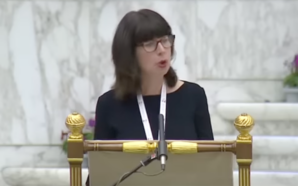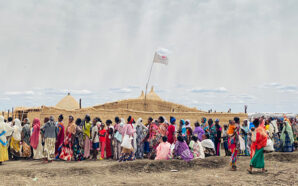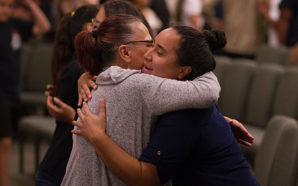Most Reverend Vincent Long Van Nguyen OFM Conv DD STL, Bishop of Parramatta
Address to the staff of the ACBC General Secretariat, Canberra
“Working for the Church in the Time of Perceived Irrelavancy”
Canberra, 22 July 2019
INTRODUCTION
I’d like to thank you all for giving me this opportunity to reflect with you on our role as co-workers with the Bishops of Australia in this difficult time. As one fiesty old mother was reported to have made this or a similar comment to her daughter: “How can you work for a bunch of hypocrites?”
That is not an unusual comment – under the circumstances. If people were asked what they thought of the Catholic Church, their responses would be something in the order of ‘no credibility, focused on power, sexual abuse’ and other labels that are less than complimentary. There might be some positive comments. But overwhelmingly, there is a perception that the Church has lost touch and has become irrelevant in the lives of people.
In The Wizard of Oz, Dorothy wakes up to find that she is no longer in her safe, comfortable and familiar hometown of Kansas but in the topsy-turvy Land of Oz. We Catholics need to wake up to the reality that the Church is no longer in the safe harbour of Christendom or any semblance of it. Instead, we are in this new and uncharted territory. The Church is in this liminal space between the death of the old comfort zone and the emergence of the new reality, which we must come to terms with.
Because of my background of being a refugee, I have a particular interest in the biblical experience of the exile. I believe that we should do well to draw on the great spiritual legacy of our ancestors in faith.
In the exile, God’s people experienced a profound loss. From being a great nation with all the status symbols of power, they were reduced to a stateless and dejected people. Yet, it was in that moment of utter vulnerability, they gained a new insight into what it meant to be God’s people. There was a paradigm shift, a fundamental change in the way they related to God, to others and the world around them. They gradually came to a new understanding of the disorientation, dislocation and marginalisation that was forced upon them. They learned to re-engage with their spiritual legacy – without the familiar symbols of identity, like the temple, the priesthood, the festivals, the land et cetera. Removed from their once safe, secure and prosperous world of yesteryear, the exiles or more precisely the faithful remnants reimagined their faith story in a way that enabled them to make sense of their lived experience.
We can see evidence of this prophetic reframing in the writings of the prophets. For example, Isaiah speaks of “the house of God” being established on the mountain where nations would come to worship together. Thus, the exile was seen as a vehicle by which Israel would bring about a new world order under God’s rule. Similarly, Ezekiel envisions a new temple, which would surpass the old in its life-giving capability. These metaphors point to a new reality towards which God’s people are called. In effect, their faith relationship grew beyond the confines of physical symbols of land, temple and rituals into new horizons of love, compassion and justice. They realised that their mission was not to build a strong and powerful nation but to be an alternative society under God’s rule, a covenanted community of neighbourly service.
This prophetic re-imagination is fitting for us as we find ourselves in a new “captivity”. The Church in Australia after the Royal Commission is stripped off many institutional securities and privileges. Here we witness in many ways the devastating impact of secularisation, which is accelerated by the crisis of sexual abuse. Our numbers and resources are diminishing. The recent census shows that while the population of Australia increases, those who self-identify as Catholics decreases. But even far worse than these is the loss of our moral stature and trust capital. Yet like Israel, we must seek fresh ways of embodying God’s redeeming, forgiving and empowering love. The Church must not lose sight of the invitation to embark on a new adventure with God as he helps us to step out of the old and into the new.
In spite of our resistance to change, we will need to let go of the old paradigms in order to truly see the reality and hope that God is a work in the Church today. This liminal space challenges our sense of security, continuity and predictability. It is our openness and humility that allow us to recognise moments of divine rupture at the critical juncture in history.
POPE FRANCIS AND THE WAKE UP MOMENT
The arrival of Pope Francis is a game changer. The image of the newly-elected Pope bowing in silence before the euphoric, then hushed, crowd at St Peter’s Square was truly the prophetic sign of the century! With that humble gesture, the Pope exemplified a model of ministry which would correspond with the signs of the times, the needs of the people and the creative power of the Spirit. It signalled that the time had come to set aside old wineskins and reach for new. He is a leader who has unambiguously embraced the call to lead us beyond the safety of the status quo into the challenge of responding to the dislocation and marginalisation of the Church.
He has launched the Barque of Peter away from the shallow harbour of Christendom and into the tumultuous waters of the post-Christian society. He is like the pioneer who left the billabong in search of the life-giving river. He constantly urges the whole Church to go beyond itself: “I prefer a church which is bruised, hurting and dirty because it has been out on the streets, rather than a church which is unhealthy from being confined and from clinging to its own security.”
This “being out on the streets” is not about fighting for its former status and privilege or parading its force. Rather, it is about service and mission to the most vulnerable even at the risk of its own security.
Pope Francis has challenged the whole Church to wake up to the new reality with a new attitude. He said that we are not living in an era of change but change of era. It cannot be status quo at any cost, because the ground under our feet has shifted. There needs to be an attitudinal change at every level, a conversion of mind and heart that conforms us to the spirit of the Gospel, a new wine into new wineskins, not a merely cosmetic change or worse a retreat into restorationism.
The Catholic Church has had its Damascus moment in the sexual abuse crisis. It has fallen from the privileged position in society and the power and influence that came with that status. Now, like Paul, who was led into a place of vulnerability, we are undergoing a time of uncertainty and darkness until we can learn to see, act and relate in the way of Christ the Humble Servant. We should not fear this time, which is a kind of a Holy Saturday experience. It is a time of ambiguity, of mourning and yet hoping for Good News; it is a liminal interval, a time in which one stands between the old and the new.
BEYOND THE CLERICALIST MODEL
It is becoming increasingly evident that sexual abuse crisis in the Church is a symptom of a broken system and a dysfunctional culture. The clericalist model of Church with its by-product of clerical hegemony has served us well beyond its use by date. The Church as understood and articulated by the Second Vatican Council sees itself as a pilgrim People of God, incarnate in the world. It is a new paradigm – one that is based on partnership, collaboration, participation and empowerment as opposed to the old way of clerical control, and monopoly at worst, or lay subservience and passivity at best.
The time has come for us to implement decisively this participatory, inclusive and collaborative model in our ecclesial structures. The Royal Commission recommends that the clerical governance structures be reviewed, drawing from the modes of governance already implemented in Catholic health, community services and education agencies. We need to create a Church more humble, transparent and accountable to the faithful and the community at large. The time has come for the Church to be truly the Church of the baptised and together with the ordained, all the People of God can create a new culture of humility, accountability and service.
It seems to me that the Church cannot have a better future if it persists in the old paradigm of triumphalism, authoritarianism and male hegemony. She will not be fully energised while the faithful are still unable to participate with full citizenship in its life, governance structures and decision making processes. So long as we continue to exclude the laity, especially women from the Church’s governance structures, decision making processes and institutional functions, we deprive ourselves of richness of our full humanity.
NEW WAYS OF BEING CHURCH
It is possible and indeed necessary to speak about new ways of being Church as we leave behind any remnant of the Christendom. Australia was not part of the Holy Roman Empire or the Papal States. But the way of our being Church has been steeped in the old paradigm of clerical order, control and hegemony. There was a reluctance to break with the past and thus for a time, there was an effort to hold on to the old paradigm by what was known as the hermeneutic of continuity as opposed to that of rupture. Interestingly, this holding on resulted in what was known as restorationism or the reform of the reform, rooted in traditional theology and practices.
Pope Francis is often the critic of clericalism especially in the cohort of young priests and seminarians. One cannot fight clericalism without challenging the system that allows it to fester. Indeed, one cannot fight clericalism while subscribing to theology and practices that infantilise the laity. Hence, the Pope often speaks of an “inverted pyramid” which is a radical way of exercising power and authority. It is not a top-down and centralised approach reminiscent of the monarchical model. Rather, it is a synodal church at every level, with everyone listening to each other, learning from each other and taking responsibility for proclaiming the Gospel. Vatican II already spoke of the key principles: collegiality, subsidiarity and sensus fidelium, all of which pointed to a more listening, dialogical and inclusive church.
Pope Francis has really lived up to his vision of the Church daring to break loose from its comfort zone and self-referential mentality. He has challenged us to be a compassionate, merciful, open and inclusive church. He has privileged a style of leadership, which involves more deep respectful listening and collective discernment.
The Second Vatican Council presented a new paradigm: the Church is not an enclosure which protects its members against the sinful world. It is a fellow pilgrim with the men and women of our age. It is a Church incarnate in the world. Therefore, it is time not of fearful retreat, disengagement and self-referential pomp, but of accompaniment and engagement.
Francis declares, “The thing the Church needs most today is the ability to heal wounds and to warm the hearts of the faithful; it needs nearness, proximity”. That is his vision of the ideal Church. Not a perfect society, nor the enclosure for the privileged but a refuge for the poor, an oasis for the weary and a hospital for the wounded.
CONCLUSION
There is a sense that we are being cut loose from the safe and secure moorings of the past. But that has been the pattern of the Judeo-Christian story even since Abraham and Sarah left the land of Ur to go to where the spirit beckoned. It’s in their DNA and ours to read the signs of the times and follow where the river flows. It is not in yearning for or holding onto the known and the familiar but in reimagining the future and venturing into the unknown chaos like the old exodus that we shall find new life. We can react with fear, despair or denial in these unsettling times. This was the way many Israelites reacted when faced with the barren desert. I suspect many of our contemporaries do the same with respect to the crisis in the Church. There is something hauntingly similar between the Israelites’ penchant for certitudes of Egypt and many of Pope Francis’ critics’ demands for dogmatic clarity.
The time that we are living in can be likened to Holy Saturday in the Gospel. It is a liminal interval, a time in which one stands between the old and the new. Our task is to live the creative tension between the pain of the present and the hope of the future. The Catholic Church in this country will face diminishment and decline as a result of combined forces such as the secularisation of our society, the institutional malaise and of course, the impact of the Royal Commission. There will be collateral damage that will impact adversely on the Church’s mission. And that’s alright as long as we like the midwives during the slavery in Egypt know how to deliver and nurture new life in the face of painful transition.
It humbles me that God is in the mess, the margins, the disorientation and even in the perceived irrelevancy of the Church. It comforts me, too, to know that the Church was not at its best when it reached the heights of its power in what was known as Christendom. The Church was at its best when it was poor, persecuted and powerless. All of the metaphors and all of the dispositions of Jesus point to a humble Church: a little salt, a little yeast and a little light. Christendom and for the most part of history, we have tried to be great, powerful and dominant. This liminal time may turn out to be the best time to be part of a humble, inclusive and servant Church.
With Pope Francis, I pray that we be led from the old way, which is deeply steeped in clerical practice and structure to the new ways of being Church that will convey the freshness of the Gospel.
Most Rev Vincent Long Van Nguyen OFM Conv
Bishop of Parramatta








